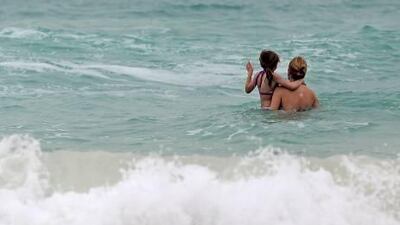DUBAI // Beach safety officials yesterday defended the measures they take to warn swimmers of potential danger after three men drowned in separate incidents in Dubai at the weekend.
"We have municipality observers patrolling the beaches especially during bad weather, instructing people not to approach the water," said Ibrahim Mohammed from Dubai Municipality's Coastal Management Administration.
"But our role is purely advisory and we cannot stop people entering the water. We provide guidance, put up weather warning flags, but we cannot force people not to swim."
Martin Hayle, 50, a British tourist, drowned off JBR Open Beach at around 1.45pm on Friday. At 3.30pm, a second British man identified by police as PF, 50, also drowned at JBR Open Beach. The third victim, Haja Mohammed Ismailuddin, 26, from India, was swimming at Umm Suqeim 1 Beach when he drowned at around 4.30pm.
"I don't understand why there is no one patrolling the beaches today or why there are no extra signs warning people of rough seas, despite three people drowning over the weekend," said Andy Walters, 33, a British ship broker and trained lifeguard who was at Umm Suqeim 1 beach yesterday.
Heike Glassner, from PRM International, who is the UAE representative for the Royal Life Saving Society UK, said the problems lay in a lack of regulations.
"The only mandatory regulation in Dubai is the pool lifeguard rule," she said. "It is not even mandatory for hotels to have beach lifeguards, which raises the concern that the lifeguards who are employed may not even be qualified."
Officials said their warnings and intensified patrols to caution against swimming were ignored by the public.
"All the unmanned beaches are fitted with instructive signs for swimmers," said Mr Mohammed.
The signboards caution that no lifeguards are present and that swimmers should enter the water only during daylight hours and in good weather conditions.
The National Centre for Meteorology and Seismology puts out public warnings on their website against swimming and informs authorities if waves are higher than three metres. On Friday the waves were recorded at 4.3 metres with a wind speed of 32 knots.
"Some people simply do not care, despite continual warnings about the danger of swimming in such conditions," said Captain Yahya Mohammad, head of Sea Rescue at the Dubai Police Rescue Department.
The rescue police, who patrol JBR Open Beach, Umm Suqeim Beach 1 and public beaches in Jumeirah and Hamriyah, intensify their patrols in bad conditions.
"But many people, especially those who are coming from the other emirates, simply are not interested in what we have to say and, apart from warning them, there is nothing else we can do," said Capt Mohammad.
"They are swimming at their own risk and we do not have any authority to ban them from entering the sea. We can't arrest people who do not take our advice."
Former lifeguard Walters said: "There are so many tourists who come to Dubai, and especially to Umm Suqeim 1 Beach. Yet there are no watchtowers or men with binoculars watching the swimmers, like on beaches in other countries. We need better trained lifeguards. There was no need for these people to have drowned."
Carl De Villiers, owner of Surf Shop Dubai, said the Umm Suqeim 1 was a poorly managed beach.
"How many people will have to die before lifeguards are put on duty?" he said.
Part of the issue in implementing more comprehensive safety practices lies in the decentralised administration of beaches.
Public beaches in Dubai are managed by two departments at Dubai Municipality.
The Public Parks administration oversees beach safety at Mamzar Beach Park, Jumeirah Beach Park, Jumeirah Open Beach (next to Dubai Marine Club) and the Dubai Creek Park.
These beaches employ lifeguards, have first aid stations, and use other safety measures including a flag warning system.
A red flag signals it is unsafe to swim, a yellow flags signals caution and a white flag gives the all-clear.
The remainder of Dubai's public beaches - including the popular Umm Suqeim 1 Beach and JBR Open Beach, where the drownings occurred - are overseen by the municipality's Coastal Management department and have only instructional signboards and no full-time lifeguards.
"I think Dubai Municipality should take the initiative and make the move to implement a mandatory trained lifeguards on all the beaches," said Ms Glassner.
* Additional reporting by Wafa Issa and Preeti Kannan

